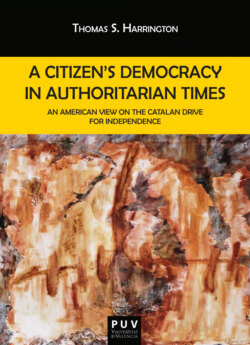Читать книгу A Citizen's Democracy in Authoritarian Times - Thomas S. Harrington - Страница 8
На сайте Литреса книга снята с продажи.
Оглавление“Washington Seeks Stability. It is Not Likely to Recognize a Catalan State”[18]
Independence “For the United States government, any change that might also have fiscal or economic repercussions is viewed as a threat”
Harrington believes that Catalonia would be viable as an independent state, but also believes the movement needs to intensify its advocacy work around the world.
He’s never lived permanently in Catalonia, but he speaks Catalan perfectly. It was a British teacher who opened his eyes to Spain’s national realities, and since that time he has not stopped studying those realities and communicating them to others from his position as Professor of Hispanic studies at Trinity College in Connecticut. Thomas Harrington, an American, mentions Catalonia a lot in his classes, speaking about the “miracle” that it, in many ways, represents. And he looks forward enthusiastically to the watershed events that will be taking place this Fall. However, (speaking in a telephone interview with ARA) he regrets that the government of his country, the United States, doesn’t see things in the same way. He thinks it’s very unlikely that Washington would recognize an independent Catalonia.
MF: How do the US media cover what is happening here?
TH: The English-speaking media tends to highlight the decisions made by political leaders as opposed the realities of citizen activism. Thus, the recent meeting between Rajoy and Mas received much greater coverage than the mass demonstration on September 11th. It’s rather frustrating. But the main problem is the mass media’s insistence on confusing the watershed moment that Catalonia is now experiencing with Spain’s fiscal crisis. We need to educate people a little here in the USA, so as to make a clear distinction between that contemporary situation and this historically-rooted matter.
MF: Is Catalonia at a watershed at the moment?
TH: I think it is, providing that it succeeds in dealing appropriately with the issue of self-persuasion among the Catalans. A little psychotherapy is in order before they can suddenly become a state after so many years of fighting just to be a nation. We’ll have to see what kind of leadership capacity Catalan civil society has to persuade the majority of the people to move forward in this way.
MF: Do you see it as all rather premature?
TH: I don’t know if you could call it premature. After 30 years of autonomy, Catalonia already possesses the foundations needed to become a state—much more so than it did during the Second Republic. With the institutions that Catalonia has now, it’s much more viable.
MF: And so you see an independent Catalonia as something viable.
TH: The question is, why not? Holland, Slovenia—these are countries with similar characteristics, and they’re perfectly viable. But those in favor of independence need to adopt a highly effective advocacy campaign to persuade the world at the same time as they work to persuade the Catalans themselves.
MF: How should we promote ourselves?
TH: I think Catalonia has some wonderful qualities: creativity, entrepreneurship and a culture of its own with a very balanced mixture of respect for tradition and modernity. You should promote yourselves as the Catalan miracle. When we look at the obstacles you have faced over the course of history, it’s really an epic achievement that we are speaking in Catalan today. That epic side of the story should be stressed more.
MF: Why do you think Spain refuses to even negotiate the fiscal agreement?
TH: Deep down, it’s a question of a mental block. Yesterday I was doing a class on the prologue from Antonio Nebrija’s Castilian Grammar from 1492. And in this prologue, we can already see the basic formula for Spain: Catholicism and the Castilian language bundled together. Everything else is secondary. I think this mental model of what a nation-state must be became very deeply rooted in Castile and, as we are seeing, any idea of a Spain in another form is, therefore considered impossible.
MF: Would the United States recognize a Catalan state?
TH: I think it’s very unlikely. Washington wants stability. It thus probably wouldn’t recognize a Catalan state. At this moment in history (and as we’ve seen from what Wikileaks has released), our foreign policy is extremely reactionary. We’re a nation that is incapable of recognizing the aspirations of most other people. US politicians and the Armed Forces are interested in stability, and stability means that nothing should change; they generally seek to maintain the status quo. The idea of a change that might also have fiscal or economic repercussions is viewed as a threat.
MF: Scotland also wants to decide on its future. Are they seen as similar cases in the United States?
TH: Scotland is part of Great Britain, and sad to say, Americans see Britain as being different from Spain. They’re our British friends, they’re a bit odd, but they’re “one of us.” The generally ignorant US perception of Iberians, in contrast, is that of people who aren’t so advanced or trustworthy. I think that for this reason the possibility of the US supporting a negotiated approach are, in the case of Britain, much be better than in the Iberian case.
[18] This is a translated version of Mariona Ferrer i Fornells, “Thomas Harrington: ‘Washington busca l’estabilitat, no reconeixeria un estat català.” Ara 8 October 2012.
